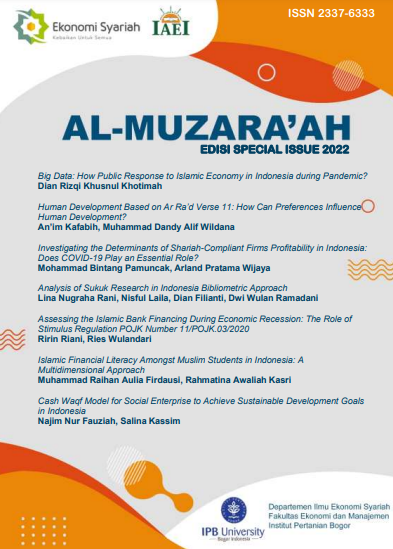Big Data: How Public Response to Islamic Economy in Indonesia during Pandemic?
Main Article Content
Abstract
The social and economic impacts caused by the COVID-19 pandemic greatly affect the level of community welfare. The government has designed and implemented various programs in the context of poverty eradication during the pandemic, including increase the role of sharia or Islamic economics. Contribution of Islamic economy can strategically beneficial for Indonesia’s current and future economy. The benefits obtained by target community need to be measured as a reflection of the success of Islamic economy program and for government evaluation. Big data through social media analysis can be empowered to gain public perceptions of Islamic economy. Therefore, in this study the Twitter social media analysis approach will be used to obtain public responses regarding Islamic economy. The tweet data was collected from January 1, 2020 to June 30, 2021. The processed data is sourced from all Twitter users with tweets related to the keywords ‘ekonomi syariah' or sharia economy, 'ekonomi digital’ or digital economy, ‘keuangan syariah’ or sharia finance, and ‘industri halal’ or halal industry. Those data were analyzed using text mining method. The results of this study indicate that in general the public response accepts and supports Islamic economy in Indonesia. Those analysis result can be used as evaluation material and input for the government in making the next policy for accelerate economy recovery in pandemic era.
Downloads
Article Details

This work is licensed under a Creative Commons Attribution-ShareAlike 4.0 International License.
Author(s) who published in this journal agree to following terms:
- Authors understand and agree that copyright of manuscripts published are held by Al-Muzara'ah. The statement to release the copyright to Al-Muzara'ah is stated in form CTA (link doc).
- Copyright encompass exclusive rights to reproduce, to distribute, and to sell any part of the journal articles in all form and media.
This work is licensed under a Creative Commons Attribution-ShareAlike 4.0 International License (CC BY-SA) where Authors and Readers can copy and redistribute the material in any medium or format, as well as remix, transform, and build upon the material for any purpose, but they must give appropriate credit (cite to the article or content), provide a link to the license, and indicate if changes were made. If you remix, transform, or build upon the material, you must distribute your contributions under the same license as the original.
References
Basu, A. J. R., Khatua, A., Ghosh, S., & Jana, A. (2017). Harnessing twitter data for analyzing public reactions to transportation policies: Evidences from the odd-even policy in Delhi, India. Proceedings of the Eastern Asia Society for Transportation Studies (EASTS).
[Bappenas] Badang Pembangunan Nasional. (2018). The Indonesia Masterplan of Sharia Economy 2019-2024. Jakarta (ID), Bappenas.
Chapra, U. (1996). What is Islamic Economics?. Islamic Research and Training Institute.
Collomb, A., Costea, C., Joyeux, D., Hasan, O., & Brunie, L. (2014). A study and comparison of sentiment analysis methods for reputation evaluation. Rapport de recherche RR-LIRIS-2014-002.
[Data Reportal]. (2021). Digital 2021: Indonesia [online]. [accessed 2021 May 23]. Retrieved from https://datareportal.com/reports/digital-2021-indonesia.
[Dinar Standard]. (2021). 2020/21 State of the Global Islamic Economy Report: Thriving in Uncertainty. Dubai (UAE), DinarStandard.
Dunn, W. N. (1999). Pengantar Analisis Kebijakan Publik, Edisi Kedua. Yogyakarta (ID), Gadjah Mada University Press.
Feldman, R., & Dagan, I. (1995, August). Knowledge discovery in textual database (KDT). In Proceedings of the first ACM SIGKDD International Conference on Knowledge Discovery and Data Mining (pp. 112-117).
Go, A., Bhayani, R., & Huang, L. (2009). Twitter sentiment classification using distant supervision. CS224N project report, Stanford, 1(12), 2009.
Primastuti, S. (2015). Anatomi Konflik Kebijakan Penambangan Pasir Besi di Pesisir Selatan Kabupaten Kulon Progo (Disertasi, Universitas Gadjah Mada, Yogyakarta, Indonesia).
Shah, M. (2018). SentR [online]. [accessed June 3, 2021]. Retrieved from https://rdrr.io/github/mananshah99/sentR/.
Soekanto, S. (1993). Kamus Sosiologi. Jakarta (ID), PT. Raja Grafindo Persada.
[Thomson Reuters]. (2019). An Inclusive Ethical Economy: State of the Global Islamic Economy Report 2018/19. Dubai (UAE), Thomson Reuters.
[UN Global Pulse]. (2015). Using twitter data to analyze public sentiment on fuel subsidy policy reform in El Salvador. Global Pulse Project Series, (13), 1-2.

